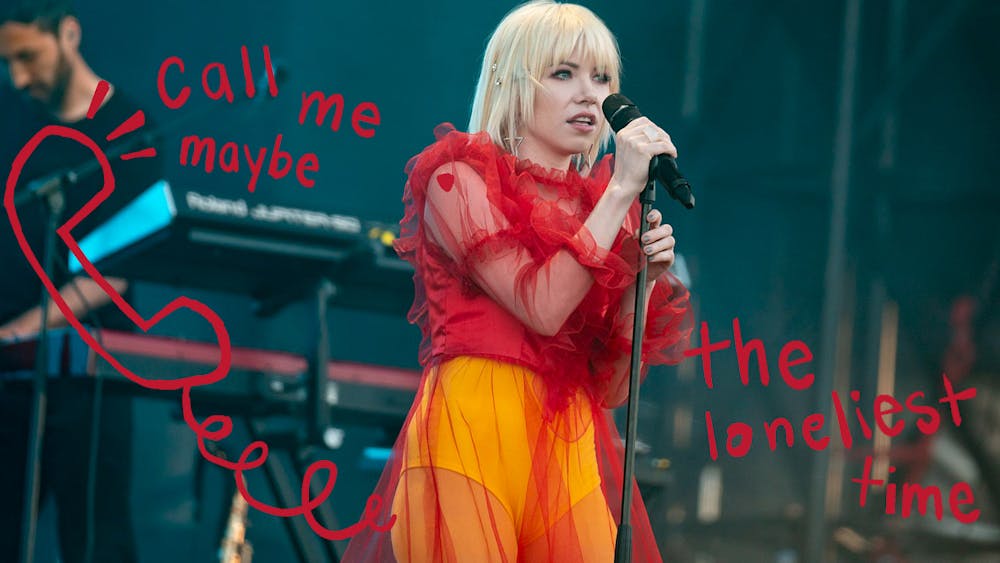A decade ago, Carly Rae Jepsen asked us to call her, maybe. And since then, we’ve left her on read, sent her to voicemail, and effectively ghosted her from the cultural consciousness. Now, ten years later, Jepsen’s new album, The Loneliest Time, is here, and it’s time for all of us to pick up the phone and give her a call.
It’s easy to downplay how massive Carly Rae Jepsen was in 2012. But for a brief time, she was irrefutably one of the biggest voices in pop music. “Call Me Maybe” was a mega–hit of nearly indescribable proportions—a song that swallowed up the radio waves for months—staying at #1 on the Billboard Hot–100 for nine consecutive weeks, charting above “Somebody That I Used to Know,” “What Makes You Beautiful,” “Starships,” “Payphone,” and “We Are Young.” In the pre–Spotify era, before everyone could find their niche, underground artists and ignore the mainstream, “Call Me Maybe” was as ubiquitous in 2012 America as Barack Obama (who was, of course, the subject of the infamous “Obama Sings ‘Call Me Maybe’” video).
Jepsen is also often mischaracterized as a “one–hit–wonder,” with people forgetting that she followed up “Call Me Maybe” with “Good Time,” her collaboration with Owl City, peaking at #8 on the Billboard charts three months later, as well as “This Kiss” entering the Top–100. But it cannot be denied that Jepsen has never replicated the heights she reached with “CMM.”
Jepsen’s career has experienced some obstacles that can be considered nothing else but bad luck. The Loneliest Time is now Jepsen’s second album in a row that is being released next to one of Taylor Swift’s. The first time was in 2019, when we all (well, except for me, I was there) ignored her album Dedicated, which was released a month after Swift's post–Reputation comeback single “ME!”—while all of us Swifties were pretending to think “ME!” was good, we could’ve been jamming to the irresistible “Want You in My Room.” “ME!” and the leadup to Lover took up all the air in the pop world, leaving no room for Carly Rae.
Now, Jepsen’s luck has worsened, as The Loneliest Time was released on the same exact day as Swift’s Midnights, the latter of which has been breaking industry records every day since its release. Jepsen joked about the timing, saying “[m]y new album will be released on Oct. 21. It should be easy to remember because it's the same day Taylor Swift is putting out her album.”
Jepsen has had traction on TikTok, with users creating their own videos using the bridge of “The Loneliest Time” (“I’m coming back for you, baby! I’m coming back for you!”), but a viral TikTok sound is not the equivalent of a #1 song. People aren’t using “The Loneliest Time” as a sound because they love Carly Rae Jepsen’s new single (in the way people are making TikToks to Swift’s “Karma”), but because the song has “meme–potential.”
While Midnights is definitely getting more attention, The Loneliest Time is a worthwhile listen. It may not be “pop–perfection”—an overused term in an era when pop fans are desperate for anything with a melody or semi–enunciated lyrics (sorry, Ariana)—but it’s another great offering from Jepsen. From the fun and sexy “Shooting Star,” to the ethereal “Bends,” and the groovy title track, there are many breezy gems in this album that make it a great pop entry.
Beyond her unfortunate luck, Jepsen is another fascinating study of the music industry’s cruel and unusual satisfaction in chewing artists up and spitting them out. Female pop stars have a particularly unfair and arbitrary position in the industry, as they’re kicked from the top as soon as they get there. They’re expected to retain youth, beauty, and also carve out a persona for themselves (because for women in music, talent usually doesn’t cut it).
For Jepsen, her slipping through the cracks may be in part due to her not having created a distinct “pop persona” for herself. She’s a songwriter, but not a generational lyricist like Taylor Swift and Adele. She has a nice voice, but isn’t a vocal powerhouse like Mariah Carey and Ariana Grande, nor is she a larger abstraction of American iconography and sexual fascination in the vein of Britney Spears and Madonna. Unfortunately for women in the music industry, you have to either fit into one of these categories, or maybe be Lady Gaga, to have sustained success.
In a recent interview with Vogue, Jepsen revealed that she “was slightly traumatized by the way ‘Call Me Maybe’ signaled [her] as a singles artist,” and the effects of that are clearly seen in her discography. She’s not trying to make the next “Call Me Maybe,” she’s just trying to make good music, which she has consistently been doing since 2012. She may not be the songstress of our generation, but Carly Rae Jepsen is worthy of her spot in the industry, and of another chart–topping hit. All we have to do is answer her calls, and listen to what she has to say.







